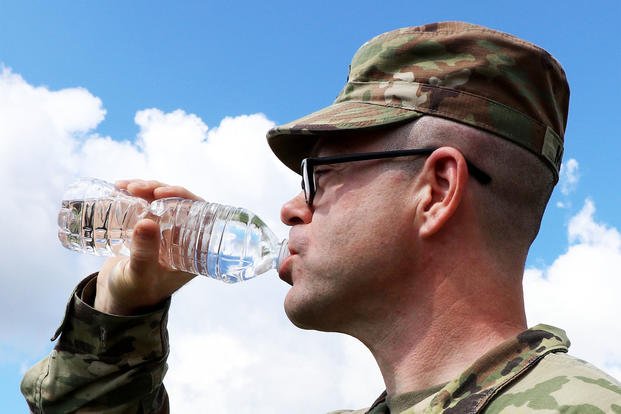This week, a young man asked me, "Does water affect weight?" After some digging, I realized he has been observing his mother use one of the 45 Day Plans to lose weight and get fit, and this program requires the user to drink more water than they normally would -- up to 3-4 quarts a day.
Most people do not drink enough water in a day. The Mayo Clinic states, "Water is your body's principal chemical component, making up, on average, 60% of your body weight. Every system in your body depends on water. For example, water flushes toxins out of vital organs, carries nutrients to your cells and provides a moist environment for ear, nose and throat tissues. Lack of water can lead to dehydration, a condition that occurs when you don't have enough water in your body to carry out normal functions. Even mild dehydration can drain your energy and make you tired.
The Institute of Medicine advises that men consume roughly 3 quarts (about 13 cups) of total beverages a day and women consume 2.2 quarts (about nine cups) of total beverages a day. Total beverages mean water and other drinks as well.
As with most things in health, nutrition and exercise, there is always some study that disproves another study.
Many doctors agree that eight ounces of water eight times a day (two quarts) has no scientific backing. This is true. Water intake does not and probably should not have a universal standard as water intake depends on the individual, environment, activity level, etc.
The explanation of this question has a few levels of details, so it is broken up in the following sections:
Daily weight gain: By drinking more water per day, you will have a series of weight gains throughout the day as a quart (32 ounces) of water weighs two pounds. So, as I write this article and sip from my 32-ounce glass, I will gain two pounds in the next 90 minutes. Now, I likely will be interrupted by Mother Nature and lose 1-2 pounds from the previous 32-ounce glass of water I drank after my early workout. The easy answer is yes; drinking water affects weight significantly enough to be seen on a scale immediately. Usually, in a 24-hour period, you will cycle through this process of gaining water weight and losing water weight and have either a net loss or stable weight for the day.
What about weight loss? Here is where I came up with the saying, "Want to Lose weight? Just Add Water!" Adding more water to your diet will help you lose weight a few ways. One, you will not be as hungry when drinking water through the day as your stomach will have something constantly flowing through it. Two, when your body realizes it is getting enough water, it will allow you to release retained waters from your cells through digestion.
I had a client who lost 20 pounds in one week after adding just water to his diet. He was so bloated that his rings did not fit him, is stomach was large, and his socks would indent his lower legs when he removed them. Have you ever felt bloated, hands and feet puffy, belly extended? Well, this is your body holding on to water. This also could be a symptom of a variety of medical issues, so alerting your doctor is never a bad idea when bloated for long periods of time with no relief. But it is also removed easily by adding water if you are just bloated due to dehydration or a high-sodium diet.
Replacement of water lost. Humans sweat, digest, and breathe. All three are processes that help our bodies to expel water. These fluids should be replaced, and depending on your activity level and environment, your replacement may be significantly different than someone with a different lifestyle. Regardless, everyone needs water. The amazing thing about the human body is that it is capable of pulling water out of every piece of food we eat. So by eating, you actually can survive and have enough water in your body to excrete toxins, sweat (some), and breathe. You can lose significant weight through sweating (like wrestlers cutting weight). This is not healthy because you are losing vital electrolytes that, if not replaced, will affect performance negatively and could cause death. However, what performance fitness experts agree on is that additional water will help us perform better by staving off dehydration, overheating, and even heatstroke. A common formula is to take a half to two-thirds of your body weight in pounds and replace that many ounces of water in a 24-hour period. For instance, I am 200 pounds, so I typically get 100 ounces of water a day, especially after exercise.
Too much water. How much is too much? I tackled this one a few years ago when a water drinking contest on the radio actually caused someone to die from water intoxication. That person had downed nearly two gallons within a short period of time (less than two hours). This caused her body to shut down, experiencing kidney failure as well as electrolyte imbalances that affect all organ function. Many endurance athletes have died from the same issues; they sweat profusely, rehydrated with only water and had the same electrolyte imbalances that caused death. When drinking water after sweating profusely, you should consider foods or supplements with electrolytes (sodium, potassium, etc.) so that does not happen. I like to eat a can of chicken noodle soup after a workout when I lose 5-7 pounds of water through sweating; it can happen in humid or arid environments. The chicken noodle soup (especially kids' double noodle style) can offer several hundred milligrams of sodium and potassium, much more than sports drinks.
Check out Too Much Water
Another question to ask is: "How does water affect weight loss?" Over a 10-day period, you can see significant weight loss by adding water to your daily intake. So, let's see for ourselves. (try at own risk)
Take a 10-day challenge: Below is a chart that will take you through a 10-day extra water-consuming process to show you that a few quarts of water a day will make you feel better, make skin look better, make you less hungry, and -- best of all -- help you release water that is retained in your body's cells - perhaps you will lose some weight:
Weigh yourself in the morning after using the bathroom and in the evening after dinner
Try adding 2-3 quarts a day for men and 1-2 quarts a day for women and let's see what happens.
Note: If you already are consuming the above amounts, there is no need to try this 10-day challenge or add more water to your diet.
Stew Smith is a former Navy SEAL and fitness author certified as a Strength and Conditioning Specialist (CSCS) with the National Strength and Conditioning Association. Visit his Fitness eBook store if you’re looking to start a workout program to create a healthy lifestyle. Send your fitness questions to stew@stewsmith.com.
Want to Learn More About Military Life?
Whether you're thinking of joining the military, looking for fitness and basic training tips, or keeping up with military life and benefits, Military.com has you covered. Subscribe to Military.com to have military news, updates and resources delivered directly to your inbox.




















